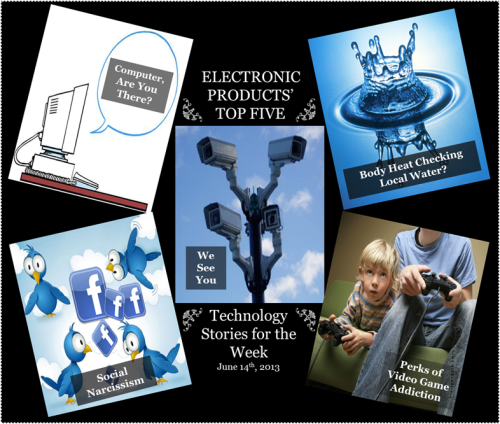Technology changes every hour, day, and week. Studies are conducted and new results are found daily. We sifted through the most recent studies and picked out the Top Five Technology Stories for the Week, including a study that encourages video game addictions, cameras that can track the movement from out of sight residents, and how to spot your most narcissistic Facebook friend.

Gamers Make Better Visual Decisions
Perks of Video Game Addiction
Next time someone tells you to turn off the video games, tell them to think again! A team of professors at the Duke School of Medicine have come to the conclusion that video gamers make better visual decisions than non-gamers. They put gamers and non-gamers to the test measuring their visual stimuli on a computer screen while showing a letter in a corner and then asking what letter was in which spot. The research showed that gamers make rapid “probabilistic inferences” of where a game character is going to go, making them able to pick out what letter was previously there faster than non-gamers.
Facebook and Twitter Reflect Users’ Narcissism
Social Narcissism
We all have that one Facebook friend who posts statuses all the time. A new study at the University of Michigan is saying that narcissism is linked to those loud and opinionated Twitter and Facebook friends. Researchers say that users are generally concerned for creating an image of themselves and seeing how people respond to that image and gain approval. College students tend to use Twitter as their loudspeaker while adults are sticking with Facebook. They are unable to tell if time on a social media website is linked to the amount of statuses and tweets, but it is clear that the friends saying the most are the most narcissistic.
New Software Hopefully Takes a Step in the Direction of a Talking Computer
Computer, are you there?
So, we can talk to our gadgets using voice control, but why is it taking so long to be able to converse with our computers and laptops? For 50 years, developers have been in the process of creating software for talking computers. The main issue they are running into is the linguistics and different meanings behind words. For example, we have years of experience, so we can distinguish between the different meanings of the word “charge”, a horse charges and criminals are charged with false credit card charges. The University of Austin research team is continuing on making it past this barrier by programming different points for paraphrases.
Cameras to Track People Even When They Go Out of View
We See You
Researchers at Carnegie Mellon University have come up with a system that tracks people indoors when they move out of sight from the camera. The first experimental implantation was tracking the movements of people within a nursing home. The team promises the purpose of the new system is not to spy or watch residents too closely but to simply alert the caregivers of a major change in activity for health reasons. However, this tracking is only available for short periods of time as a replay, not real-time. Further work will strive to advance this to real-time.
Invention of a Self-Generating Power Source to Check Water Quality on the Way
Body Heat Checking Local Water?
A more efficient way of checking water is in the works, say researchers at the University of Waterloo. The team is working on an instrument that will run on solar power, body heat, or another power source that will test water quality without having to bring a sample back to the lab. The team’s main focus is bringing the instrument from a sensory level to a micro-instrument level and finding a power source that won’t require an external source. Experiments have already been conducted with a sugar-cube sized sensor that screens for contaminants using ultraviolent light and wavelengths.
Advertisement
Learn more about Electronic Products Magazine





